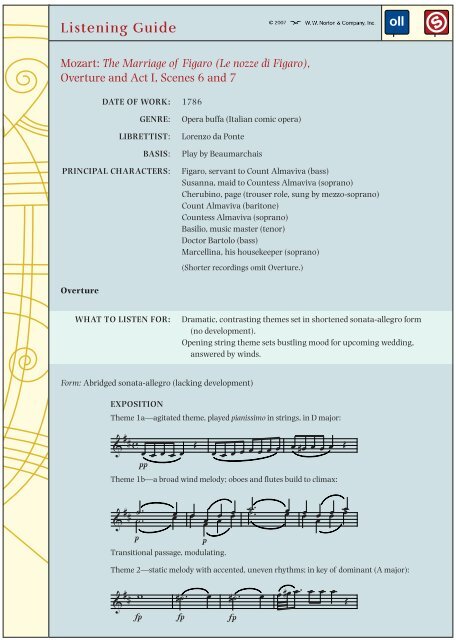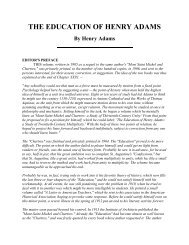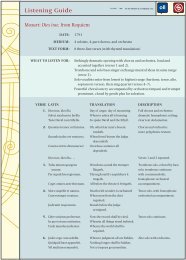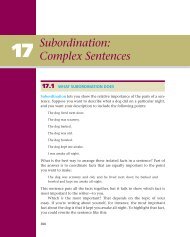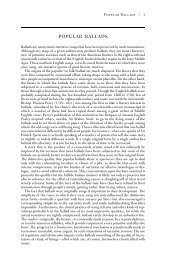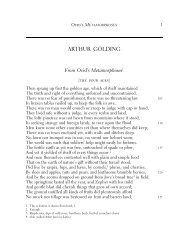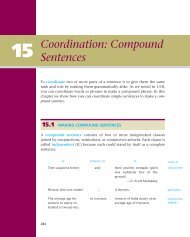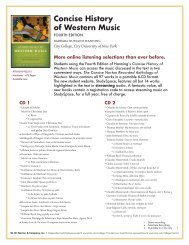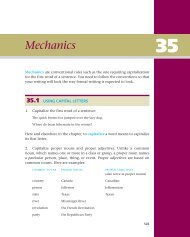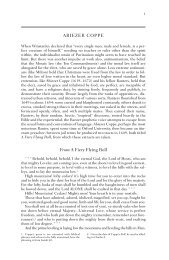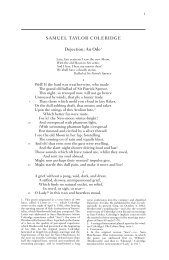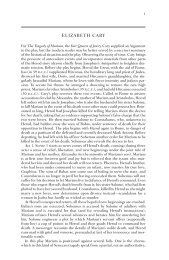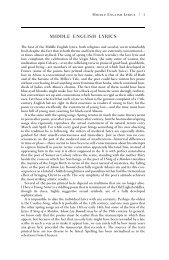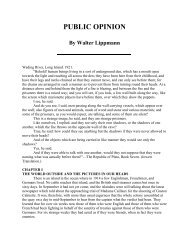Create successful ePaper yourself
Turn your PDF publications into a flip-book with our unique Google optimized e-Paper software.
<strong>Listening</strong> <strong>Guide</strong><br />
Mozart: The Marriage of Figaro (Le nozze di Figaro),<br />
Overture and Act I, Scenes 6 and 7<br />
DATE OF WORK: 1786<br />
GENRE: Opera buffa (Italian comic opera)<br />
LIBRETTIST: Lorenzo da Ponte<br />
BASIS: Play by Beaumarchais<br />
PRINCIPAL CHARACTERS: Figaro, servant to Count Almaviva (bass)<br />
Susanna, maid to Countess Almaviva (soprano)<br />
Cherubino, page (trouser role, sung by mezzo-soprano)<br />
Count Almaviva (baritone)<br />
Countess Almaviva (soprano)<br />
Basilio, music master (tenor)<br />
Doctor Bartolo (bass)<br />
Marcellina, his housekeeper (soprano)<br />
Overture<br />
& # #c<br />
œ œ œ œ œ<br />
π<br />
(Shorter recordings omit Overture.)<br />
WHAT TO LISTEN FOR: Dramatic, contrasting themes set in shortened sonata-allegro form<br />
(no development).<br />
Opening string theme sets bustling mood for upcoming wedding,<br />
answered by winds.<br />
Form: Abridged sonata-allegro (lacking development)<br />
EXPOSITION<br />
Theme 1a—agitated theme, played pianissimo in strings, in D major:<br />
Œ<br />
œ œ œ œ œ œ œ œ œ #œ œ œ œ Œ<br />
Theme 1b—a broad wind melody; oboes and flutes build to climax:<br />
& # # ˙ .<br />
˙.<br />
œ œ œ œ œ<br />
œ œ œ<br />
˙ . œ œ œ œ œ<br />
œ œ œ<br />
p p<br />
Transitional passage, modulating.<br />
Theme 2—static melody with accented, uneven rhythms; in key of dominant (A major):<br />
& # # w #˙. œ #˙. œ œ #œ œ . œ œ œ<br />
fp fp fp<br />
Œ
Closing theme (first part)—a rising motive that turns downward:<br />
? # # œ œ œ œ #œ œ œ<br />
& # # ˙. #œ œ #œ œ œ<br />
& bb b C œ J œ j<br />
Œ<br />
œ œ œ œ #œ œ œ<br />
Closing theme (second part)—lyrical melody in A major:<br />
RECAPITULATION<br />
œ œ œ œ œ. œ œ œ œ<br />
£<br />
Theme 1a—returns, in D major.<br />
Theme 1b—answers, in D major.<br />
Theme 2—in D major.<br />
Closing themes.<br />
Coda—descending scale passages and forceful chords lead to end.<br />
Act I, Scenes 6 and 7<br />
Scene 6: Aria, Cherubino.<br />
WHAT TO LISTEN FOR: Breathless and quick opening of love song, reflecting the character’s<br />
emotional state.<br />
Return of opening (A) unifies the 4-part structure (A-B-A-C).<br />
Form: A-B-A-C, followed by recitative<br />
A—quick rhythms (in E flat):<br />
B—more lyrical (in B flat):<br />
A—return (in E flat).<br />
C—begins quietly, then builds<br />
in E flat, modulates:<br />
œ œ j œ j œ<br />
œ J œ J<br />
œ œ Œ<br />
Non so più co - sa son, co - sa fac - cio,<br />
& bb b ˙ . nœ œ nœ J œ J<br />
& bb b œ œ J<br />
œ œ J œ J<br />
œ œ Ó<br />
So lo ai no - mi d’a - mor di di - let - to,<br />
œ J<br />
œ œ œ œ ˙<br />
Par - lo d’a - mor ve - glian - do.<br />
CHERUBINO<br />
A Non so più cosa son, cosa faccio, I don’t know what I am, what I’m doing;<br />
or di foco, ora sono di ghiaccio, first I seem to be burning, then freezing;<br />
ogni donna cangiar di colore, every woman makes me change color,<br />
ogni donna mi fa palpitar. every woman I see makes me shake.<br />
B Solo ai nomi d’amor, di diletto, Just the words “love” and “pleasure”<br />
mi si turba, mi s’altera il petto, bring confusion; my breast swells in terror,<br />
e a parlare mi sforza d’amore yet I am compelled to speak of love<br />
un desio ch’io non posso spiegar. by a force which I cannot explain.<br />
A Non so più cosa son, . . .<br />
C Parlo d’amor vegliando, I speak of love while waking,<br />
parlo d’amor sognando, I speak of love while dreaming,<br />
all’acqua, all’ombra, ai monti, to the water, to shadows, to mountains,<br />
ai fiori, all’erbe, ai fonti, to the flowers, the grass, and the fountains,<br />
etc.<br />
etc.<br />
etc.
all’eco, all’aria, ai venti, to the echo, to the air, to the winds<br />
che il suon de’vani accenti, which carry the idle words<br />
portano via con se. away with them.<br />
C Parlo d’amor . . .<br />
E se non ho chi m’oda, And if there is no one to listen,<br />
parlo d’amor con me! I’ll speak of love to myself!<br />
(Seeing the Count in the distance, Cherubino hides behind the chair.)<br />
Recitative: Susanna, Count, Basilio<br />
WHAT TO LISTEN FOR: Rapid, conversational style that moves action ahead.<br />
Fortepiano playing accompaniment, with cello.<br />
CHERUBINO<br />
Ah! Son perduto! I’m done for!<br />
SUSANNA<br />
Che timor . . . il Conte! Misera me! I’m afraid . . . the Count! Poor me!<br />
(tries to conceal Cherubino)<br />
COUNT ALMAVIVA (entering)<br />
Susanna, tu mi sembri agitata e confusa. Susanna, you seem to be agitated and confused.<br />
SUSANNA<br />
Signor, io chiedo scusa, My lord, I beg your pardon,<br />
ma, se mai, qui sorpresa, but . . . indeed . . . the surprise . . .<br />
par carità, partite. I implore you, please go.<br />
COUNT<br />
(sits down on the chair and takes Susanna’s hand; she draws it forcibly away)<br />
Un momento, e ti lascio. Odi. One moment, then I’ll leave. Listen.<br />
SUSANNA<br />
Non odo nulla. I don’t want to hear anything.<br />
COUNT<br />
Due parole: tu sai che ambasciatore Just a word; you know that the king<br />
a Londra il Re mi dichiarò; has named me ambassador to London;<br />
di condur meco Figaro destinai. I had intended to take Figaro with me.<br />
SUSANNA<br />
Signor, se osassi— My lord, if I dare—<br />
COUNT (rising)<br />
Parla, parla, mia cara, Speak, speak, my dear,<br />
e con quel dritto ch’oggi prendi su me, and with that right you have of me today,<br />
finchè tu vivi chiedi, imponi, prescrivi. as long as you live, you may ask, demand,<br />
prescribe.<br />
SUSANNA<br />
Lasciatemi, signor, Let go of me, my lord,<br />
dritti non prendo, I have no rights,<br />
non ne vò, non ne intendo. I do not want them, nor claim them.<br />
Oh me infelice! Oh, what misery!
COUNT<br />
Ah no, Susanna, io ti vò far felice! Ah no, Susanna, I want to make you happy!<br />
Tu ben sai quanto io t’amo; You well know how much I love you;<br />
a te Basilio tutto già disse. Basilio has told you that already.<br />
Or senti, se per pochi momenti meco Now listen, if you would meet me<br />
in giardin, sull’imbrunir del giorno, briefly in the garden at dusk,<br />
ah, per questo favore io pagherei . . . ah, for this favor I would pay . . .<br />
BASILIO (outside the door)<br />
E uscito poco fa. He went out just now.<br />
COUNT<br />
Chi parla? Whose voice is that?<br />
SUSANNA<br />
O Dei! Oh, heavens!<br />
COUNT<br />
Esci, ed alcun non entri. Go, and let no one come in.<br />
SUSANNA<br />
Ch’io vi lasci qui solo? And leave you here alone?<br />
BASILIO (outside)<br />
Da madama sarà, vado a cercarlo. He’ll be with my lady, I’ll go and find him.<br />
COUNT<br />
Qui dietro mi porrò. I’ll get behind here.<br />
(points to the chair)<br />
SUSANNA<br />
Non vi celate. No, don’t hide.<br />
COUNT<br />
Taci, e cerca ch’ei parta. Hush, and try to make him go.<br />
SUSANNA<br />
Ohimè! che fate? Oh dear! What are you doing?<br />
(The Count is about to hide behind the chair; Susanna steps between him and the page. The count<br />
pushes her gently away. She draws back; meanwhile the page slips round to the front of the chair and<br />
hops in with his feet drawn up. Susanna rearranges the dress to cover him.)<br />
BASILIO<br />
Susanna, il ciel vi salvi! Heaven bless you, Susanna!<br />
Avreste a caso veduto il Conte? Have you seen his lordship by any chance?<br />
SUSANNA<br />
E cosa deve far meco il Conte? And what should his lordship be doing here<br />
Animo, uscite. with me? Come now, be gone!<br />
BASILIO<br />
Aspettate, sentite, Figaro di lui cerca. But listen, Figaro is looking for him.<br />
SUSANNA (aside)<br />
Oh cielo! Oh dear! Then he’s looking for the one<br />
Ei cerca chi, dopo voi, più l’odia. man who, after you, hates him most!
COUNT (aside)<br />
Vediam come mi serve. Now we’ll see how he serves me.<br />
BASILIO<br />
Io non ho mai nella moral sentito I have never heard it preached that<br />
ch’uno ch’ama la moglie odi il marito, one who loves the wife should hate the husband;<br />
per dir che il Conte v’ama. that’s a way of saying the Count loves you.<br />
SUSANNA<br />
Sortite, vil ministro dell’altrui sfrenatezza: Get out, vile minister of others’ lechery!<br />
io non ho d’uopo della vostra morale, I have no need of your preaching<br />
del Conte, del suo amor! nor of the Count or his lovemaking!<br />
BASILIO<br />
Non c’è alcun male. No offense meant.<br />
Ha ciascun i suoi gusti. Everyone to their own taste.<br />
Io mi credea che preferir I thought you would have preferred<br />
doveste per amante, as your lover,<br />
come fan tutte quante, as all other women would,<br />
un signor liberal, prudente, e saggio, a lord who’s liberal, prudent, and wise,<br />
a un giovinastro, a un paggio. to a raw youth, a mere page.<br />
SUSANNA<br />
A Cherubino? To Cherubino?<br />
BASILIO<br />
A Cherubino! Cherubin d’amore, To Cherubino! Love’s little cherub<br />
ch’oggi sul far del giorno who early today<br />
passeggiava qui intorno per entrar. was hanging about here waiting to come in.<br />
SUSANNA<br />
Uom maligno, un’impostura è questa. You insinuating wretch, that’s a lie.<br />
BASILIO<br />
E un maligno con voi Do you call it an insinuation<br />
chi ha gli occhi in testa? to have eyes in one’s head?<br />
E quella canzonetta, And that little ditty,<br />
ditemi in confidenza, tell me confidentially<br />
io sono amico, as a friend,<br />
ed altrui nulla dico, and I will tell no one else,<br />
è per voi, per madama? was it written for you or my lady?<br />
SUSANNA (aside)<br />
Chi diavol gliel’ha detto? Who the devil told him about that?<br />
BASILIO<br />
A proposito, figlia, istruitelo meglio. By the way, my child, you must teach him<br />
Egli la guarda a tavola sí spesso, better. At table he gazes at her so often<br />
e con tale immodestia, and so wantonly,<br />
che s’il Conte s’accorge— that if the Count noticed it—<br />
e sul tal punto sapete, egli è una bestia— on that subject, as you know, he’s quite wild—<br />
SUSANNA<br />
Scellerato! e perchè andate voi You wretch! Why do you go around<br />
tai menzogne spargendo? spreading such lies?
BASILIO<br />
Io! che ingiustizia! I! How unfair!<br />
Quel che compro io vendo, That which I buy I sell,<br />
a quel che tutti dicono, and to what is common knowledge<br />
io non ci aggiungo un pelo. I add not a tittle.<br />
COUNT (emerging from his hiding place)<br />
Come! che dicon tutti? Indeed! And what is common knowledge?<br />
BASILIO (aside)<br />
Oh bella! How wonderful!<br />
SUSANNA<br />
Oh cielo! Oh heavens!<br />
Scene 7: Terzetto (Trio), Count, Basilio, Susanna<br />
WHAT TO LISTEN FOR: Lively exchanges between 3 characters, each with different emotional<br />
reaction to the situation.<br />
Structure reminiscent of a 3-part sonata-allegro form (with<br />
development and recapitulation).<br />
Form: Sonata-type structure, with development and recapitulation<br />
Style: Quick exchange between voices; much text repetition; each character with own emotional<br />
commentary<br />
The Count—angry:<br />
Basilio and the Count—comforting<br />
Susanna, who has fainted:<br />
The Count etc.<br />
? bb ˙ . œ œ œ Ó<br />
Co - sa sen - to!<br />
& bb ˙. œ œ. œ j Basilio<br />
¬<br />
œ œ ˙. œ<br />
Ah! già svien la po - ve -<br />
? bb ∑ ˙. œ œ ‰ œ Count<br />
œ œ<br />
L<br />
J<br />
COUNT<br />
Ah! già svien la po - ve<br />
Cosa sento! Tosto andate, I heard it all! Go at once,<br />
e scacciate il seduttor! throw the seducer out!<br />
BASILIO<br />
In mal punto son qui giunto; I have come at an unfortunate moment;<br />
perdonate, o mio signor. forgive me, o my lord.<br />
SUSANNA<br />
Che ruina! me meschina! What a catastrophe! I am ruined!<br />
Son’ oppressa dal dolor! Terror grips my heart!<br />
COUNT<br />
Tosta andate, andate . . . Go at once, go . . .<br />
BASILIO<br />
In mal punto . . . I have come . . .<br />
etc.
SUSANNA<br />
Che ruina! What a catastrophe!<br />
BASILIO<br />
. . . son qui giunto; . . . at an unfortunate moment;<br />
COUNT<br />
. . . e scacciate il seduttor. . . . and throw the seducer out.<br />
BASILIO<br />
. . . perdonate, o mio signor. . . . forgive me, o my lord.<br />
SUSANNA<br />
Me meschina! I am ruined!<br />
Me meschina! I am ruined!<br />
Son’ oppressa dal dolor. Terror grips my heart.<br />
BASILIO, COUNT (supporting Susanna)<br />
Ah! già svien la poverina! Ah! The poor girl’s fainted!<br />
Come, oh Dio! le batte il cor. O God, how her heart is beating.<br />
BASILIO<br />
Pian, pianin, su questo seggio— Gently, gently on to the chair—<br />
(taking her to the chair)<br />
SUSANNA (coming to)<br />
Dove sono? Cosa veggio? Where am I? What’s this I see?<br />
Che insolenza! andate fuor. What insolence! Leave this room.<br />
BASILIO, COUNT<br />
Siamo qui per aiutarvi, . . . We’re here to help you, . . .<br />
BASILIO<br />
. . . è sicuro il vostro onor. . . . your virtue is safe.<br />
COUNT<br />
. . . non turbarti, o mio tesor. . . . do not worry, sweetheart.<br />
BASILIO<br />
Ah, del paggio, quel che ho detto, What I was saying about the page<br />
era solo un mio sospetto. was only my own suspicion.<br />
SUSANNA<br />
E un’insidia, una perfidia, It was a nasty insinuation,<br />
non credete all’impostor. do not believe the liar.<br />
COUNT<br />
Parta, parta il damerino, . . . The young fop must go, . . .<br />
SUSANNA, BASILIO<br />
Poverino! Poor boy!<br />
COUNT<br />
. . . parta, parta il damerino. . . . the young fop must go.
SUSANNA, BASILIO<br />
Poverino! Poor boy!<br />
COUNT<br />
Poverino! poverino! Poor boy! Poor boy!<br />
ma da me sorpreso ancor! But I caught him yet again!<br />
SUSANNA<br />
Come? How?<br />
BASILIO<br />
Che? What?<br />
SUSANNA<br />
Che? What?<br />
BASILIO<br />
Come? How?<br />
SUSANNA, BASILIO<br />
Come? che? How? What?<br />
COUNT<br />
Da tua cugina, At your cousin’s house<br />
l’uscio jer trovai rinchiuso, I found the door shut yesterday.<br />
picchio, m’apre Barbarina I knocked and Barbarina opened it<br />
paurosa fuor dell’uso. much more timidly than usual.<br />
Io, dal muso insospettito, My suspicions aroused by her expression,<br />
guardo, cerco in ogni sito, I had a good look around,<br />
ed alzando pian, pianino, and very gently lifting<br />
il tappeto al tavolino, the cloth upon the table,<br />
vedo il paggio. I found the page.<br />
(imitating his own action with the dress over the chair, he reveals the page)<br />
Ah, cosa veggio? Ah, what do I see?<br />
SUSANNA<br />
Ah! crude stelle! Ah! wicked fate!<br />
BASILIO<br />
Ah! meglio ancora! Ah! better still!<br />
COUNT<br />
Onestissima signora, . . . Most virtuous lady, . . .<br />
SUSANNA<br />
Accader non può di peggio. Nothing worse could happen!<br />
COUNT<br />
. . . or capisco come va! . . . now I see what’s happening!<br />
SUSANNA<br />
Giusti Dei, che mai sarà! Merciful heaven, whatever will happen?<br />
BASILIO<br />
Cosí fan tutte . . . They’re all the same . . .
SUSANNA<br />
Giusti Dei! che mai sarà Merciful heaven! Whatever will happen?<br />
Accader non può di peggio, Nothing worse could happen!<br />
ah no! ah no! ah no! ah no!<br />
BASILIO<br />
. . . le belle, . . . the fair sex,<br />
non c’è alcuna novità, there’s nothing new about it,<br />
cosí fan tutte. they’re all the same.<br />
COUNT<br />
Or capisco come va, Now I see what’s happening,<br />
onestissima signora! most virtuous lady!<br />
or capisco, ecc. Now I see, etc.<br />
BASILIO<br />
Ah, del paggio, quel che ho detto, What I was saying about the page<br />
era solo un mio sospetto. was only my own suspicion.<br />
SUSANNA<br />
Accader non può di peggio, ecc. Nothing worse could happen, etc.<br />
COUNT<br />
Onestissima signora, ecc. Most virtuous lady, etc.<br />
BASILIO<br />
Cosí fan tutte, ecc. They’re all the same, etc.


